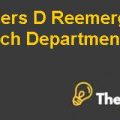Introduction
In this case, we are asked to diagnose and analyze a 56 year old female, whohas been feeling very exhaustedfor 3 months and is also gaining weight because of the menopause since last year. She joined gym for losing weight but does not seem to lose any and is feeling morehungry and thirsty. She wanted to know the reason behind the excessive weight gain and tiredness. She also mentioned that she has to go the bathroom more frequently, twice at night and more often during the day and this too is happening for3 months.
The case consists of threetypes of diagnosis: primary, secondary and differential.Each diagnosis includes the ICD 10 codes, and is cited with scholarly references and guidelines. The diagnosis is explained by pathophysiology statements that incorporate both negative and positive objective and subjective findings that integrate the diagnosis with the patient.
The purpose of this case study is to develop a management plan for the patient.After a detailed analysis of the subjective and objective information provided,we are required to suggest appropriate health guidelines and strategies for disease prevention. For developing appropriate evidence based plans and diagnosis for mature and aged individuals, pharmacologic assessment and incorporation of appropriate tools are required in functional assessments.
Assessment
Assessment of this case includes all three diagnosis categories i.e. primary, secondary and differential diagnosis including a pathophysiology statement:
Nursing Assignment Harvard Case Solution & Analysis
Primary diagnosis:
The primary issueidentified of the patient is the excessive weight gain.For three months she has been feeling exhausted and does not seem to have enough energy to perform daily task. Even though she joined gym, she did not lose any weight and instead of losing weight, she gained 3 pounds and is urinating more frequently.
Diabetes:
Pathophysiology statement:
The pathophysiology of type 2 diabetes involves a series of dysfunction indicated by hyperglycemia, resulting from the composition of lacking of insulin secretion and resistance to the insulin action and uncontrolled glucagon secretion.(Romesh Khardori, 2018).
(icd10data.com, ICD-10-CM Codes › E00-E89, 2018).
Signs and symptoms:
- Urinating often.
- Feelingvery thirsty.
- Feelingvery hungry
- Extreme fatigue.
- Blurry vision.
- Cuts/bruises slow to heal
- Promote hypothyroidism, which can cause weight gain.(american diabetes association, n.d.)
Rational statement:
Extreme fatigue, irritation and tiredness reflect low blood sugar level.The symptoms identified reflect diabetes 2, causing the person feeling thirsty and hungry, frequent urination and unexplained weight loss caused due to hypothyroidism as the diabetes promote hypothyroidism, which can cause weight gain.
Hypothyroidism:
Pathophysiology statement:
Hypothyroidism is a condition causing your thyroid gland to become overactive thus resulting in over production of the hormone thyroxin. It can significantly activate the body metabolism, causing increase in weight and an irregular transition in the heartbeat and irritability.(Aleppo, 2018)
(icd10data.com, 2018 ICD-10-CM Diagnosis Code E03.9, 2018)
Signs and symptoms:
- Weight gain
- Fatigue
- Breath issues
- Increase in blood sugar levels
- Change in appetite
- Vision changes
Rational statement:
A person having hypothyroidism will produce excessive amount of hormones T3 and T4, causing thyroid. These hormones modulate the metabolism, dealing with how body uses energy and processes..................
This is just a sample partical work. Please place the order on the website to get your own originally done case solution.










